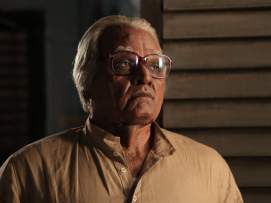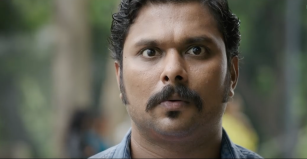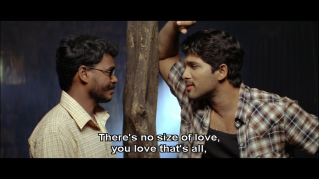
Vijay Sethupathi is known for his tendency to choose rather more unconventional roles and for his 25thfilm he takes on the character of an ageing theatre actor in Balaji Tharaneetharan’s Seethakaathi. The film is a refreshing mix of theatrical performances, comedy and drama underlying a satirical look at the film industry and despite only appearing for roughly forty minutes of the almost three hour run time, Vijay Sethupathi is the heart and soul of the film. Mouli, Rajkumar and Sunil Reddy play the other major characters, perfectly blending comedy and drama as the story moves through the world of theatre, into the film industry and finally ends up in a court room. It’s a novel tale that’s difficult to discuss without revealing the core idea that makes it such a wonderfully quirky and offbeat film, but it’s well worth investing the time to watch Seethakaathi in the cinema to appreciate the attention to detail and sheer inventiveness of the story.
The film starts with a series of scenes from theatrical performances featuring acclaimed actor Ayya Aadhimoolam (Vijay Sethupathi). These begin with his early career and progress through the decades via various classical scenes before ending with the elderly actor performing the lead role of Aurangzeb. As the actor ages, the setting for the plays changes too, starting with an outdoor performance under the stars, moving to a packed house in a new theatre and finally to a sparsely attended show with the theatre hall shabby and showing its age and lack of funds. Watching from the wings is Ayya’s friend Parasuraman (Mouli), while his fellow actors revere Ayya and provide partisan support for the performances. This opening section is focused firmly on Ayya as the lead actor in each theatrical vignette and Vijay Sethupathi is simply incredible, holding the audience attention though long classical speeches and in truth being the mesmerising and captivating theatre actor he plays. The ageing process is well done too and the prosthetics and make-up ensure Vijay is convincing as an elderly man, although it’s his posture and slow, considered movements that authenticate his portrayal.
Despite his success, Ayya lives simply and uses an auto to get to and from the theatre. He is shown as caring deeply about his grandson and takes care of his extended family of actors and theatre workers too. Early on in his career when he is offered film roles, he declines saying that he prefers to work in front of a live audience, however, with the theatre becoming less popular, Ayya is convinced firstly to advertise his shows in the local paper, and then later to ‘appear’ in films. However, when he fails to show, first in Director Sundar’s (Bagavathi Perumal) film with Saravanan (Rajkumar) and then later for producer/actor Dhanapal (Sunil), Ayya and Parasuraman are drawn into a court case.
Balaji Tharaneetharan adds his quirky brand of comedy to the scenes set within the film industry and there are cameos from film directors Mahendran and Bharathiraja along with some other unexpected faces. In Balaji’s cinematic world, directors are shown as having the short end of the stick; having to pander to their lead actor’s whims while placating their producers and walking a fine line between creativity and farce. The producers on the other hand are more unethical and grasping, with profit being the only interest for most, while fame and fortune quickly corrupt even the most innocent of actors. Adding Ayya into this world produces some wonderful comedy and Sunil in particular is excellent in his début role. His comic timing is superb and with some excellent slap-stick added, he really has some of the funniest moments in the whole film. The difference between the slowly decaying artform of the theatre and the brash and opportunistic world of cinema is used to good effect, both for comedy and drama. Even the courtroom scenes have plenty of humour which helps to keep the action moving along, despite the overall length of the film.
The female roles here are more peripheral with Archana having little to do as Ayya’s wife Lakshmi while Ramya Nambeesan, Gayathrie and Parvathy Nair all have one or two important scenes, but then they move into the background for the rest of the film. However, on the plus side there are no unnecessary romances and none of the female roles are there solely for glamour – in fact quite the opposite, despite the setting of the film industry. A few other faces appear briefly including Karunakaran as a lawyer but the action in the second half is mainly focused on Sunil and Mouli.
The story is enhanced by Govind Vasantha’s music which fits well into the general ambience of the film and provides contrast between the worlds of the theatre and the film industry without ever being too intrusive. Cinematographer T.K. Saraskanth provides plenty of warmth and nostalgia in the theatre scenes, well-seasoned with a patina of age, while the film shoots are brighter in keeping with the more brash attitudes and modern outlook. The pace of the film changes too. The early theatrical scenes are allowed to run as they would do in a conventional theatre without any chopping and changing, but as the story moves into the present day and into the film industry the pace picks up and humour is added. Just like in any film, action moves from one location to another instead of the steady and unchanging location of the theatre. It’s another contrast that highlights the differences between the two worlds, despite both being involved with acting and the telling of stories. Another plus point are the subtitles which are grammatically correct and in beautifully visible yellow font. Thanks to Aarti Sivakumar for following in Rekhs footsteps and enhancing the dialogue by making it easily read and totally understandable.
Overall, Seethakaathi is a novel story told in an unconventional way. The early slow-paced drama eases into more commonplace action although the premise behind the plot is still unusual and one that raises further questions about the nature of art. The disappearance of the main lead so early is a bold step that pays off thanks to the good writing and accomplished performances from the rest of the cast, while Vijay Sethupathy’s performance, although short, is so amazing and incredible that the memory infuses the rest of the film. I loved every minute of this film and was surprised to realise the length as I never felt that it was dragging or that anything was unnecessary to the plot. I would have liked more Vijay Sethupathi (of course!) but the rest of the cast are simply excellent and the story works incredibly well as is, while I felt the whole point was to have the impact of the early theatrical scenes overlay the rest of the film. I haven’t seen Balaji Tharaneetharan’s earlier film Naduvula Konjam Pakkatha Kaanom as I’ve never been able to find a copy with subtitles, but I will definitely be looking out for his next release. Highly recommended for Vijay Sethupathi, the exemplary cast and an offbeat approach to an unconventional story.





























































